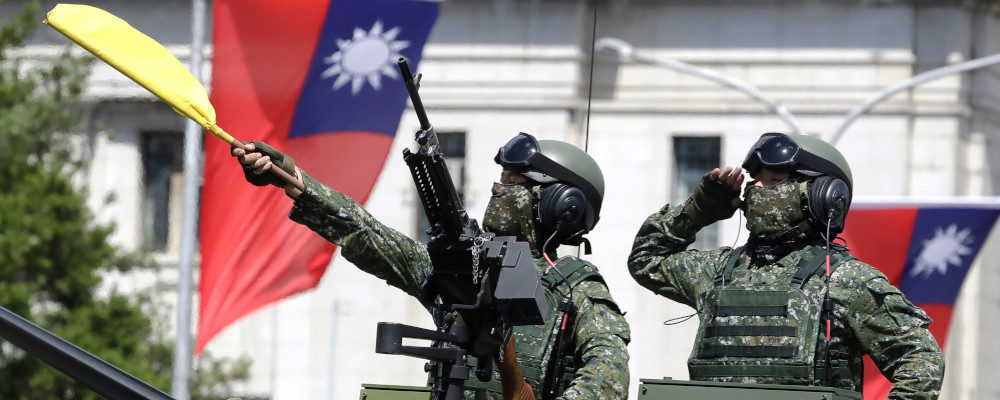Rudyard Griffiths’ interview with Chinese scholar Professor Zhang Weiwei, the Dean of the China Institute at Fudan University, is another insight into how Beijing views the world, and just how dangerous the situation is between a growing superpower in China and its neighbours, particularly Taiwan.
In the interview, Zhang said, “The Chinese foreign minister talked with his counterpart in the United States, Secretary of State Blinken, where he basically drew three red lines. One is state sovereignty, which cannot be encroached upon. That has to do with Taiwan, Tibet, Xinjiang, and Chinese islands in the South China Sea, etc. The other is that China’s political system cannot be challenged.”
Within a day of The Hub’s interview, China’s outspoken ambassador to Canada Cong Peiwu warned that Beijing wanted good relations with Canada, but “People have to understand the real status quo in the Taiwan Strait. The status quo in real terms is that there is one China in the world, of which Taiwan is an inalienable part.” Sadly, these sentiments are not new. In July 2019 China published its latest defence white paper, National Defense in the New Era, outlining its strategic guidance for the People’s Liberation Army (PLA) in what China termed a “new era.” In the document, China used unprecedented language not seen in previous defence white papers, warning Taiwan and the world that:
“China has the firm resolve and the ability to safeguard national sovereignty and territorial integrity and will never allow the secession of any part of its territory by anyone, any organization, or any political party by any means at any time. We make no promise to renounce the use of force and reserve the option of taking all necessary measures.”
In January of 2021, President Xi ordered that the PLA move to “full-time combat readiness” and that it must be ready to “act at any second.” China’s air incursion against Taiwan last week included 27 warplanes, including early warning, electronic warfare, strategic nuclear-capable bombers, refueling aircraft, and fighter planes. This represents the first time an airborne tanker was deployed to Taiwan’s air defense zone of ADIZ. Like India in the Himalayas and Japan in the Senkaku Islands, Beijing tests Taiwan’s democracy every day in some manner, probing for weakness and looking for a moment to strike.
Beijing tests Taiwan’s democracy every day.
Beijing considers Taiwan a renegade province, and many democratic countries with multi-lateral or bilateral defense ties within the Indo-Pacific region have been forced to pay lip service to a “One China Policy”. But there remains the uncomfortable truth that Taiwan is a thriving democracy and has little in common interest with the mainland. Taiwanese public opinion is geared toward the status quo, but it will fight rather than succumb to Chinese military force. Some 77 percent of Taiwanese favour independence under peaceful conditions, and some 60 percent of Taiwanese support independence in the face of a Chinese attack.
If there is to be reunification between Taiwan and China, it will be through force of arms. That should be a concern to any democracy, including Canada. This is a potential conflict with broader implications—it is important to note that Taiwanese security is linked to Japanese security, and Japan is vital to the U.S. national interest in the Indo-Pacific.
At present, a Chinese move to invade Taiwan would be fraught with challenges. Specifically, the number of troops needed to seize the island in offensive operations should the Taiwanese choose to fight, not to mention the logistic challenges of getting those forces to Taiwan and keeping them there. But that will change in President Xi’s favor in the next three to five years, and Taiwan without outside assistance will be vulnerable to invasion.
Beijing could without too much trouble seize Taiwan’s offshore island possessions, such as the strategic Pratas Island, and it could attempt to blockade Taiwan until the government gives in or Western naval intervention saves the day. China could employ missile drills to shut down the shipping routes to Taiwanese ports or attempt to subdue the island without landing forces (though they would still be needed at some point to bring about victory).
Beijing has several hybrid warfare options at its disposal, including assassination, economic warfare, cyber-attack, and subverting Taiwanese elections to empower a Chinese political ally who would then simply hand over the government. Although unlikely, China could deploy nuclear weapons to Taiwanese ports on commercial ships and use them to hold the island state hostage or employ them for an electromagnetic pulse attack. It could even carry out nuclear strikes on Taipei or other Taiwanese cities in an all-out war, but that is an unlikely and worst-case scenario. In real terms, Taiwan is in big trouble without Western military, pollical, and economic support.
Canada has a role to play in U.S.-led moves to contain China and to protect those allied states under threat in the region. We have both economic and strategic military interests at stake in the Indo-Pacific, and they do not rest with a hegemonic Beijing. Do we as Canadians really want to align our interests with a country that takes our citizens hostage, bullies its neighbours, is a genocidal police state that imprisons millions of its own Turkic peoples, and disappears its democratic activists and even its athletes ahead of the Olympics.
Sitting on our hands waiting for a Chinese invasion of Taiwan to take place ensures Taipei’s ultimate defeat. A hungry China will then turn its attention to Japan and Australia. Canada and other Western democracies need to engage now before Taiwan and the rest of us are on the receiving end of a Chinese fait acompli.
Canada needs the political will to stand tall against Beijing.
It is high time for Canada to consider military options to help deter war between China and Taiwan and our traditional military allies in the region. China is not turning back from its plan to reunify the island state with the mainland absent outside intervention. Canada no longer has the luxury of sitting on the fence. Beijing has made it crystal clear that you are either with them or against them, there is no middle ground.
Canada may be a small factor in this fight, but in coordinating with allies—Taiwan, the U.S., Japan, South Korea, and India—Canada could help to deter the Chinese attack on Taiwan. Freedom of Navigation Operations with deployed Canadian warships sailing through the Taiwan Straits demonstrates to China that Taiwan is free and that we want to keep it that way. Canada could provide training to Taiwanese special forces and military leaders at Canada’s military educational institutions.
Finally, as China ratchets up tensions we could, as Canada has done before in the Baltic States, send land, air, and sea tripwire forces to the region. Here Canada could provide Taiwan and the U.S. with a small but powerful deterrent in forward deploying stealth vessels to the area around Tawain, namely our Victoria class diesel-electric patrol submarines.
More than anything, though, Canada needs the political will to stand tall against Beijing and send a clear message to the Chinese Communist Party that we stand for the rule of law, democracy, and a peaceful and stable Indo-Pacific. Some good places to start would be to push for Taipei’s membership in WHO, ban Huawei from our 5G telecommunications system, and consider a boycott of the Beijing Olympics. Military force is not the only way to deter China and get President Xi’s attention.




